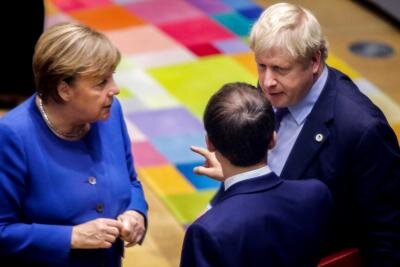Unified transatlantic focus on JCPOA: Hitting two birds with one stone

TEHRAN- France, Germany, and the United Kingdom (E3), the European parties in the 2015 nuclear talks, are setting their agenda for future negotiations with Iran to revive the JCPOA.
In this respect, the European Council on Foreign Relations (ECFR), a pan-European think tank, has commented on the issue to present the E3 with a playbook in terms of the Iran nuclear talks.
In a joint commentary published on 10 February 2021, Julien Barnes-Dacey and Ellie Geranmayeh, West Asia experts at ECFR, propose recommendations for the EU to “support the Iran nuclear deal.”
Issue linkage: A recipe for failure
ECFR argues that if the EU wants to salvage the JCPOA timely, and also open a window to negotiate with Iran on regional security, it “needs to quickly and clearly reject the argument that the two issues should be bundled together.”
Some Persian Gulf Arab monarchies as well as Israel, who largely share the idea that the Biden’s administration should maintain Trump’s maximum pressure campaign to force Tehran to offer more concessions, have increasingly insisted on engagement in future talks.
The think tank describes Washington’s regional allies’ common approach to the JCPOA as quite disruptive in the path forward and warns: “If Europeans want to contain the risks from Iran’s expanding nuclear activities quickly, it is critical that they avoid obstructing the process by pressuring Biden to tie the nuclear talks to negotiations on regional security.”
Proposing some recommendations to Biden and the E3, ECFR shed light on the followings:
- Tehran has clarified that it will not engage in further negotiations until Washington fulfils its JCPOA commitments, so both parties urgently need to re-establish a degree of trust by restoring the JCPOA.
- Concluding an agreement among Iran and the U.S.’s regional allies is hardly plausible in near future. In fact, Tel Aviv and Riyadh are not willing to negotiate with Tehran just only on the nuclear issue, leaving aside the regional concerns that Riyadh views more important to be addressed.
- Given Israel’s deliberate ambiguity on its nuclear weapons, Iran is neither willing to sit across the table with Israel nor to make further nuclear concessions.
Focus on JCPOA: Hitting two birds with one stone
In this respect, ECFR stresses that Washington and E3 should instantly focus to “contain the Iranian nuclear program before it is too late and lay the groundwork for subsequent wider negotiations on regional security.”
So, the experts clarify that the Western party should return to the initial JCPOA without any new partners’ formal presence at the table. Meanwhile, they suggest, consulting with regional allies on the JCPOA track is quite necessary.
The Berlin-based think tank strongly recommends that Europeans “should declare clear support for a focused approach on preserving this critical agreement. By doing so, they would also widen the space for negotiations with Iran on regional security.”
Geranmayeh also stresses: “The U.S. can keep Iran walking the path of diplomacy not by sustaining Trump's sanctions, but by reentering the deal and restoring its ability to snap sanctions back into place in the future if Iran violates its obligations or blocks follow-up talks.”
In other words, she points out, “Today's incentives are tomorrow's leverage and sanctions relief not only will present Biden’s administration a chance to restore confidence but also create an opportunity cost for Iran in the future.”
Dealing with Israel on Iran: A recipe for E3
In a commentary on 15 February 2021, Hugh Lovatt, a policy fellow at the ECFR, underlines that given Israel’s harsh stance on the JCPOA and its renewed saber-rattling to launch a preventive strike against Iran, the Oval Office and the E3 need to clarify for Tel Aviv that reviving the original JCPOA is still the best means of addressing “its immediate security concerns.”
He notifies that it seems that Benjamin Netanyahu’s government alongside his new Persian Gulf Arab partners are again gearing up to arrange a campaign to undermine the talks which Biden is inclined to reenter.
Lovatt describes Israel’s hardline stance against the JCPOA as “a challenge that the U.S. and E3 will have to manage carefully.” In this regard, he reminds that to complexify the future efforts to revive the JCPOA, Israelis conducted a series of sabotage operations against Tehran in the final months of Trump’s tenure.
The analyst warns that by blocking the diplomatic process, this strategy is a high-risk one and there is little to indicate that the Israelis will play a constructive role in support of the nuclear talks.
Therefore, ECFR puts forward a number of advices to Biden’s administration to restrain disruptive intentions of the Israeli government:
- The U.S should privately relay its preparedness to deny Israel from offensive weapons that could enhance its operational capacity to attack Iran. Meanwhile, the Oval Office can go on bolstering Israel’s defensive capabilities
- The U.S. and E3 should be ready to call out potential future Israelis’ covert attempts inside Iran to impair the diplomatic process.
- Netanyahu, with the help of Mossad Director Yossi Cohen, has ignored dissenting views in the security establishment to just focus on the Iranian profile. In fact, his policy to put politics ahead of security is a major issue that the U.S. and E3 should tap into.
Lovatt emphasizes that such an approach can prove proportionate to fulfill two major objectives: “revival of the 2015 JCPOA as a point of departure to concluding a broader agreement that would address other Israeli concerns.”
Finally, ECFR stresses that dealing with Israel is a task that the U.S. and E3 must grin and bear because “reaching an agreement on Iran’s nuclear program that prevents a regional arms race must remain the immediate focus. It is also a more attainable goal than changing Iran’s regional behavior or halting its missile development.”
Leave a Comment